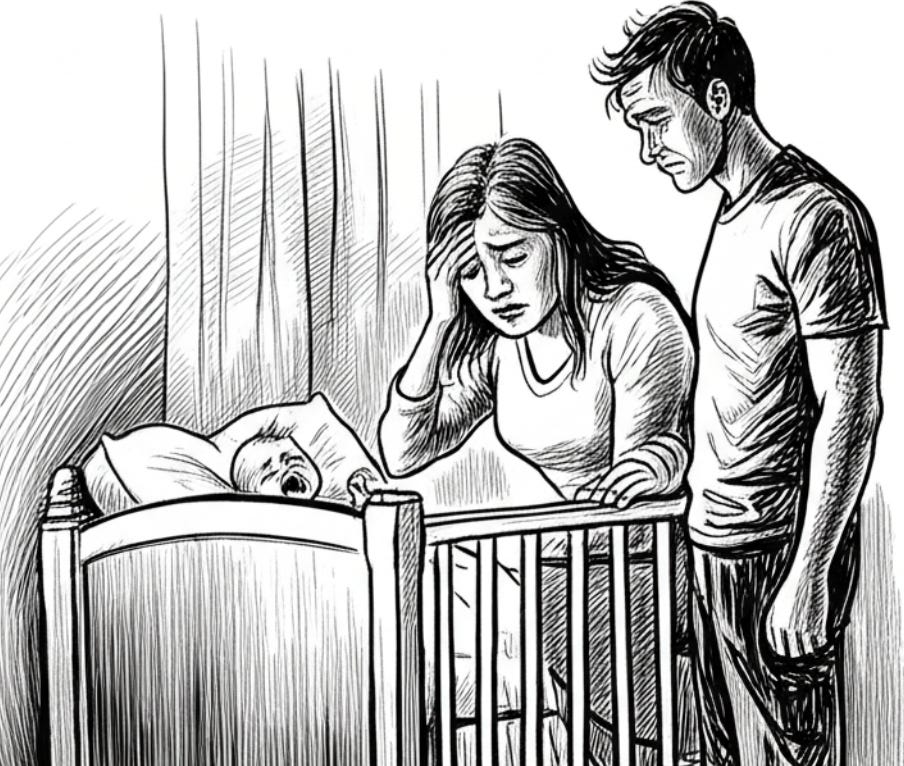You Should Probably Just Cry It Out
Sleep training, thanks to mommy blogs and parenting "experts" has turned into a moral battleground
In an upcoming episode of the Mom Wars podcast, Bethany and I discuss sleep training and the dreaded Cry It Out method. We both came to the consensus that first-time-moms drastically overthink it, and convince themselves that they are evil for even considering it to get a good night sleep. By kid four and five, Bethany says, you don’t have time to feel bad about it anymore and honestly you’re pretty numb to screaming by that point. I’m on day three of CIO so thought I would share my thoughts below.
There's a special kind of terror that grips first-time mothers when someone mentions "cry it out." The phrase alone sparks up images of abandonment, attachment disorders, and irreversible psychological damage. Thanks to the endless parade of mommy bloggers and self-proclaimed parenting experts who've turned sleep training into a moral battleground, we've somehow convinced ourselves that letting a baby cry for a few minutes is tantamount to child abuse.
Here's the thing: the data doesn't support the hysteria.
Emily Oster (who by this point is my child’s best hope, and when my husband and I disagree on anything the default is, “What does Emily Oster say?”) has analyzed the data around sleep training research and has concluded what many of us suspected all along—cry it out methods actually work better than gentler approaches, and they don't cause lasting harm. Her review of studies using baby monitors found that both modified extinction (checking on baby periodically) and unmodified extinction (the full cry-it-out approach) were significantly more effective than parental presence methods. The kicker? Parents reported no differences in bonding or child wellbeing across methods.
The average parent in these studies started sleep training around five months, but plenty did it earlier or later with similar success rates. What mattered wasn't the timing—it was the consistency. And here's where the full cry it out has a distinct advantage: it's easier to be consistent when you're not in the room second-guessing every whimper.
I’m learning this firsthand with my daughter. As the mom, I find cry it out surprisingly manageable. I know she is safe, fed, and dry. Sometimes babies just need to sleep, and sometimes they need to figure out how to do it themselves. My husband, bless his soft heart, is a different story. Every cry feels like a personal attack on his soul. But even he’s a believer when we saw the results so far: sixteen minutes the first night, six the second, and just two minutes by the third night. I’m hoping that within a few days there will be no cries at all.
The real tragedy isn't that babies cry for a few minutes while learning to sleep—it's that we've scared parents away from a method that could genuinely improve their quality of life. Sleep-deprived parents aren't better parents. They're exhausted, irritable, and running on fumes. I recently reminded my husband about the time when our baby was two weeks old, and at 4 a.m, when I was on my third wake up, he mentioned he was tired so I threw a pint glass towards his head. (It didn’t hit him!) The survey responses Oster collected tell the story: "Sleep training saved my sanity and marriage!" and "I would literally be dead without sleep training."
Of course, sleep training isn't mandatory. If co-sleeping or endless night wakings work for your family, more power to you. But if you're drowning in exhaustion and considering cry it out, don't let the fear-mongering stop you. Sometimes the kindest thing you can do for your child is teach them to sleep—even if it means putting up with some screaming along the way.






Sleep training saved my life and marriage. Taking Cara Babies is the best. I encountered such hostility to it when I (at first) unknowingly shared my experiences trying to be helpful but not realizing how controversial this tactic is to so many moms. It still bewilders me.
Cry It Out is wonderful when parents implement it at the appropriate age. However, it simply doesn't work for all kids and shouldn't be presented as a universal approach. Sleeping through the night (like any milestone) is not something all babies are ready for at the same age. Some babies will continue to scream and scream for far longer than their families can handle, with no sign of improvement. Kids get up at night at lots of ages for lots of reasons. It is part of parenting.